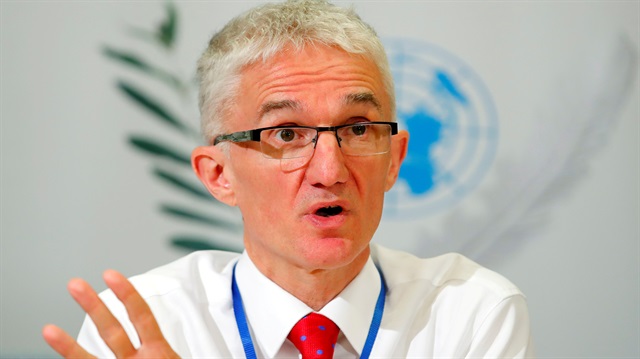
Offensive in Idlib could lead to ‘worst humanitarian catastrophe in the 21st century,’ UN aid chief tells Anadolu Agency
A large-scale Syrian regime offensive in the opposition stronghold of Idlib could lead to the “worst humanitarian catastrophe in the 21st century”, the UN’s humanitarian chief warned on Tuesday.
Mark Lowcock, under-secretary-general for Humanitarian Affairs and Emergency Relief Coordinator, has expressed alarm over the military preparations of the Bashar al-Assad regime, after his talks in Damascus last week.
“This has the potential to be the worst humanitarian catastrophe in the world in the 21st century,” he told Anadolu Agency, and called for diplomatic efforts to avoid it.
Lowcock underlined that around 4 million people living in and around Idlib, among them more than one million children, were in an extremely vulnerable situation.
“Many of them have been displaced multiple times. Many of them are living under tents, they have no shelter, they are extremely vulnerable,” he stressed.
Located near the Turkish border, Idlib has long been controlled by various armed opposition groups. It was designated as a “de-escalation zone” during the Astana peace talks.
Lowcock recalled that in the past years, many fighters from Aleppo and Eastern Ghouta were relocated to Idlib, as part of agreements.
“The Eastern Ghouta and the Aleppo situations were ultimately resolved by fighters and their families and others being relocated …and they were relocated in Idlib. But now there is nowhere else to be to go,” he said.
“For the sake of those millions and millions of people, and a million children in Idlib, there needs to be a solution which does not involve enormous massacres, and there needs to be a dialogue, just as there was in the south of Syria, over the last few weeks,” he added.
Lowcock called for diplomatic efforts involving regional actors to avoid a great, bloody battle for Idlib.
On Tuesday, Russian warplanes bombed several areas in Idlib, raising worries of a major assault by the Assad regime forces and its allies.
A trilateral summit of Turkey, Russia and Iran on Syria is scheduled for Friday, with the participation of Turkish President Recep Tayyip Erdogan, Russian President Vladimir Putin and Iranian President Hassan Rouhani.


